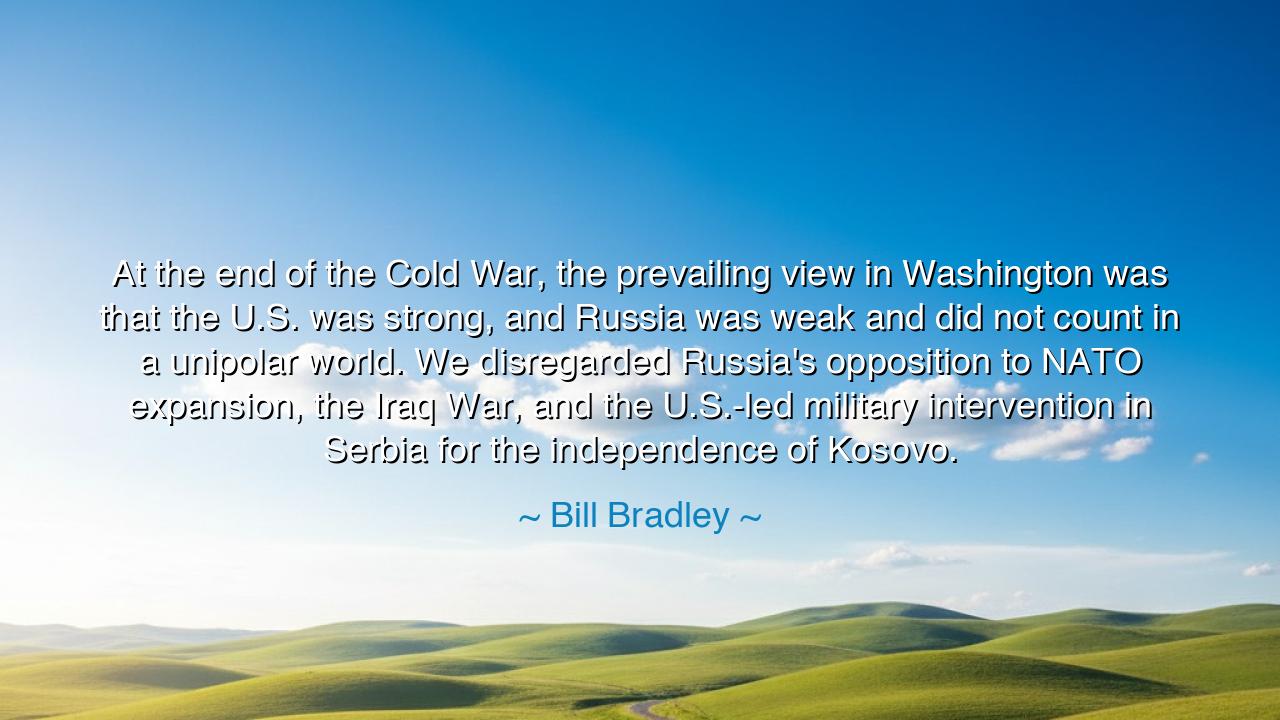
At the end of the Cold War, the prevailing view in Washington was
At the end of the Cold War, the prevailing view in Washington was that the U.S. was strong, and Russia was weak and did not count in a unipolar world. We disregarded Russia's opposition to NATO expansion, the Iraq War, and the U.S.-led military intervention in Serbia for the independence of Kosovo.






There comes a time after every great victory when power becomes a veil, blinding even the most vigilant of nations. The words of Bill Bradley, in recalling the years after the Cold War, speak not only of geopolitics but of the ancient human flaw — hubris, the pride that precedes decline. He said, “At the end of the Cold War, the prevailing view in Washington was that the U.S. was strong, and Russia was weak and did not count in a unipolar world.” In these words lies a timeless warning: that when one stands too tall, he forgets the ground upon which he walks.
When the Soviet Union fell, the world heaved a sigh of relief. The long shadow of nuclear fear receded, and the West, triumphant, believed the age of rivalry had ended. The United States, the sole superpower, saw itself as guardian of a new era — a unipolar world, where its will shaped destiny. Yet the embers of the past never die easily. Beneath the ashes of defeat, Russia’s pride smoldered, waiting for wind and time to rekindle it. But Washington, flush with success, disregarded Russia’s opposition to NATO expansion, ignored its protests during the Iraq War, and dismissed its outrage over the bombing of Serbia and the independence of Kosovo. What was seen as strategy became, in hindsight, the sowing of bitterness — and history does not forget the seeds we plant.
Such arrogance is not new to the story of humankind. In the annals of Greece, after Athens triumphed over Persia, she too believed the world bent to her will. She extended her power over smaller city-states, demanding tribute and obedience. But Sparta, though wounded and cautious, never accepted her subjugation. In time, Athens’ pride led to the Peloponnesian War, and the empire that had once stood as the beacon of democracy fell into ruin. So it was, and so it is again: victory blinds, humility restores, and balance, once lost, demands retribution.
Bill Bradley’s reflection, though born in the halls of politics, echoes like an ancient oracle. It is not merely about nations; it is about the human condition. When one forgets to listen, when one assumes strength eternal and opposition irrelevant, the spirit decays. The Cold War did not truly end — it merely shifted its form, from open confrontation to quiet resentment. The unipolar dream was a mirage; the world, ever cyclical, moves toward equilibrium. For as the wise have said, the river may seem calm, but its depths are always moving.
There is also a lesson of respect buried within this truth. The wise ruler, the just leader, must see not only his own light but the shadows cast by it. To disregard another’s pain or protest, even that of a rival, is to build one’s throne on sand. The U.S., in dismissing Russia’s perspective, underestimated the deep wells of history — of humiliation, of lost greatness, of longing for recognition. Every nation, like every person, carries the weight of its pride and wounds. To ignore them is to forget that even the smallest spark can light a fire that consumes empires.
And so, the story continues. The world that once seemed secure in American dominance is now fractured, contested, uncertain. The echo of past mistakes resounds in new conflicts and shifting alliances. Bill Bradley’s words, then, are not a reproach alone — they are a call for humility, a plea that those who lead remember that strength without understanding is the beginning of decline. The lessons of history are not to be read, but to be lived, heeded, and remembered.
My child, take this wisdom into your heart: whether in power or in life, never disregard the voice of the other. Listen, even when you are strongest; respect, even when you have won. For every empire that forgets humility will one day kneel before the consequences of its pride. Let nations and souls alike learn that the measure of true greatness is not dominance, but balance — not conquest, but compassion. And in that balance lies the only peace that endures.






AAdministratorAdministrator
Welcome, honored guests. Please leave a comment, we will respond soon